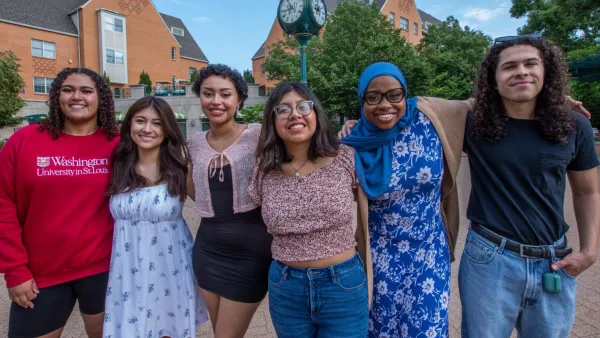The 2024–2025 academic year has been an eventful one for WashU Political Science. We devoted the year to strengthening our reputation as a world class research department, both on campus and nationwide. With a highly consequential election in the fall, our faculty were involved in many campus events focused on rights and disinformation, and offered expert opinions to local and national press outlets. We continued our excellence in research with multiple articles published in top journals and key national grant awards. We also embarked on a hiring effort to expand our expertise in key areas such as China, International Relations, and Formal and Normative Theory.
All of this work is in support of Political Science Chair Betsy Sinclair’s stated tenets of the department: intellectual ferocity and radical empathy. These two ideas drive a passion for learning and research combined with an understanding and recognition of every student and faculty member’s unique backgrounds. This allowed us to focus on three essential metrics—student development, pioneering research, and a deep exchange of ideas—in guiding us to a stronger and more well-rounded department.

Student Development
When the department looks at key indicators of strength, the most logical place to begin is our students. One could have a stable of top-notch faculty, but if the students that come through our doors aren’t leaving academically sound then it is all for naught. This is why our faculty is focused on a holistic approach to student learning. The faculty believes that no matter where students are when they begin the program, they will receive the tools and knowledge they need to succeed.
First year PhD candidate, Zeynep Ceren Topac, spoke to this idea recently, saying that what makes the department unique is that it “never loses sight of the individual student.”
“Whether you’re new to the field or on the job market,” Ceren Topac said, “there’s a strong culture of mentorship and support to help you grow and succeed at every stage.”
That support and growth also extends outside the classroom. Many students have the opportunity to participate in high-level research by assisting with collecting and interpreting data and co-authoring articles for major political science journals. Our graduate students have published articles in Research & Politics, Journal of Peace Research, International Organization, and the American Journal of Political Science, among others.
Students also receive support to showcase their own research on a national level. They are encouraged to submit their research to publications, poster competitions, and subfield conferences. This year our graduate students have received multiple awards:

- Third year PhD candidate, Masanori Kikuchi, received the Best Visualization Award from the Journal of Peace Research for his article “How does war affect cultural tolerance? Evidence from concert programs, 1900–60.”
- Annie Jarman won the prestigious Sophonisba Breckinridge Award for best paper on the topic of women and politics from the Midwest Political Science Association.
- Fifth year PhD candidate, Rex Deng, won the 3rd annual Rebecca Morton Poster Prize at the NYU Rebecca B. Morton Conference on Experimental Political Science for his poster “Screened Realities: How Entertainment Foster Political Compliance in China.”
- Graduating PhD, Annamaria Prati, won the 2024 Best Poster Award from the American Political Science Association for her poster “Building Peace in Fragile States? UNDP and Violence Mitigation.”
Our incredible graduate students have also had great success in post-graduation placement. In the previous three years our PhDs have received tenure-track positions at UCLA, NYU, UT-Austin, Loyola Chicago, University of Kentucky, and Emory, post-doctoral fellowships at Oxford, Harvard, and Max Planck Institute, as well as positions at the National Science Foundation, US Census Bureau, and private sector companies. This year’s cohort received tenure track positions at Rice University, Texas A&M, and Notre Dame, and a post-doctoral fellowship at NYU. These are all incredible achievements showcasing the strength and exemplary reputation of our department.
Pioneering Research
It’s not just political science students finding research and publishing success—our faculty have had a banner year as well. Faculty members such as Michael Strawbridge, Jacob Montgomery, Amy Pond, and Diana Z. O’Brien all had multiple articles published this academic year. Other faculty members have received awards and grants for their work including Timm Betz, Ted Enamorado, Michael Olson, and Lucia Motolinia—with Olson receiving the Emerging Scholar Award from the American Political Science Association and Motolinia the Early Career Award from the Midwest Political Science Association’s Women’s Caucus.

This continued excellence from our faculty provides a shining example to our students, and to faculty and experts around the country. A recent article in Political Science & Politics titled “A Global Ranking of Research Productivity of Political Science Departments,” looked at the research output of 178 departments across 45 countries in a study to find standardized metrics to rank departments around the world. Specifically, the study looked at three factors: total number of citations of all faculty publications, the five-year impact factors of all journals in which faculty are published, and number of publications in top journals. Those journals include American Political Science Review, American Journal of Political Science, Journal of Politics, International Organization, and World Politics.
The article found that WashU ranked in the top 10 in multiple metrics. For the number of articles in those top publications, WashU ranked 7th overall and when adjusted for size of our faculty that rank jumped to 4th. For the number of recent articles in top publications, WashU ranked 3rd overall and 2nd when adjusted. Also, faculty member Jim Gibson ranked first in top publications, and Diana Z. O’Brien tied for fourth in recent top publications.
These numbers are strong indicators of the world-class work our faculty is doing and their impact on the discipline. Furthermore, this year our graduate program was ranked 13th overall by the widely read US News & World Reports while maintaining the same cumulative score as the 2021 rankings. Both reports show that our department is a consistent top performer among departments around the world.

Deep Exchange of Ideas
This academic year also had us looking toward the future by developing and strengthening the scope of our expertise by hiring new faculty. Over the summer, the department welcomed Christina L. Boyd, Lee Epstein, Jaclyn Kaslovsky, Michael Strawbridge, and post-doctoral fellow Peng Peng to our faculty. Shortly after the start of the academic year the department was excited to secure Hannah Simpson and Carlo Horz. They both began teaching this Spring.
Throughout the fall, the department interviewed over 20 different candidates to further expand our faculty. After multiple months of interviews and job talks, the department hired four new faculty members to strengthen our knowledge base on China, International Relations, and Formal and Normative Theory: Victoria Shen, Ophelia Vedder, Elaine Yao, and Juan Dodyk.
China
The politics of China was a key area of focus for hiring due to its growing relevance on the world stage. “Recent faculty hires have not only strengthened our department but also broadened our expertise to new geographical areas,” said Dr. William Taussig Professor in Arts & Sciences, Margit Tavits. “In particular, three recent hires bring new and critical expertise in the politics of China from different and complementary perspectives.” She went on to say:
“Professor Peng takes a historical approach and studies state building in imperial China. Professor Shen brings expertise in understanding public policy making and energy policy in contemporary China, particularly in the area of environmental policy. Professor Yao has contributed to research on authoritarian responsiveness and propaganda, with a focus on China.”
The combined expertise from these three new faculty members will “significantly enhance the departments standing in China scholarship,” Tavits said, “allowing us to offer nuanced perspectives on how authoritarian regimes develop, implement policies, and maintain legitimacy.” These are all key areas of knowledge in today’s geopolitical landscape.
International Relations
When it comes to International Relations, there are two key branches of scholarship: conflict and international political economy (IPE). “In conflict, Carly Wayne (who this year was awarded tenure) is working on a series of projects on extremism,” said Sinclair, and “in IPE, Timm Betz and Amy Pond’s work on tariffs is increasingly important.”
The department also will be offering a unique joint class with the medical school focused on international borders and public health. The class will be taught by Professor David Carter (who focuses his work on borders), Professor Matt Gabel (a judicial politics expert), and cardiologist Mark Huffman (who studies international public health).
Formal Theory

This year also saw the strengthening of department expertise in Formal Theory, the mathematical and statistical analysis approach to political science and political economy. “It has been an exceptional year for the field of formal theory at WashU,” said Professor and Director of Graduate Studies, Keith Schnakenberg. The new faculty starting in 2025 bring a wealth of knowledge in Formal Theory to our students. Hannah Simpson studies the political economy of legal institutions, Carlo Horz studies propaganda and authoritarian politics, Elaine Yao studies dynamic models of collective decision making, and Juan Dodyk studies the political economy of climate policies and special interest politics.”
“We [also] continued our new tradition of holding a conference for some of the top graduate students and postdocs in the field of formal theory, “Schnakenberg added, “This was our second such conference and was an engaging and educational experience.” Students and postdocs came from institutions all over the country. The department is also organizing a voluntary formal theory workshop for graduate students this summer. Schnakenberg said the workshop “is an opportunity for our graduate students to work independently on theoretical projects with input from our faculty.”
Environmental Policy

One of the more popular focuses in the political science curriculum has been the Environmental Policy major. Given the rise of climate disasters in the last decade, more and more students are looking for a way to study climate change through the lens of politics. Director of the Environmental Policy major, Professor Dino Christenson, along with the help of political science faculty and staff, has spent the last year revamping the major’s requirements to meet the growing demand for environmental courses.
“While we maintained the rigorous engagement with political methodology and policy analysis, as well as the foundation courses in environmental science and normative theory” Christenson said, “the increased offerings in environmental courses across campus afforded us the opportunity to expand our list of upper-level courses that count for the major and give more flexibility to students.”
Christenson also stated that by formalizing a long-held encouragement for obtaining practical environmental experiences, students now get credit towards the major for completing experiential learning courses, environmental internships, directed research projects, and honors theses. “Today’s environmental policy majors are equipped to engage the most pressing problems of our time,” explained Christenson. “[The students] will be joining the impressive ranks of [previous] students…already helping to fight climate change, waste and pollution – and build a more sustainable future for us all.”
Looking to the future
There is a certain air of uncertainty looking toward the future for many academic programs—not only at WashU, but across the country. Funding is being cut on a large scale, and this will interrupt important research for our department and faculty. However, the steps taken to strengthen our department this past year will create a solid foundation for the 2025–2026 academic year and beyond. The department is looking forward to all the incredible work our faculty and students will engage in, and we hope you will follow along with us.





